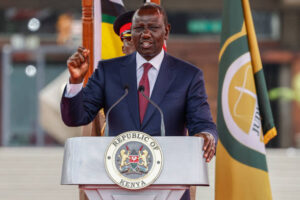
By Thomas Mauko
President William Ruto’s planned tax changes, according to the Law Society of Kenya, will undo the progress made towards achieving national equality.

According to LSK President Faith Odhiambo, adding more taxes to lower-income Kenyans will negatively affect their standard of living and means of subsistence because they already face hardships due to the high cost of living.
“This in itself is an antithesis to the national goals and objectives,” Odhiambo said.
The Finance Bill, 2024, proposes a number of new tax policies with the goal of broadening the tax base and raising income from Kenyan residents.
According to Odhiambo, the different exemptions and benefits introduced by the Finance Act, 2023 seem to be reversed or diminished in the new plans.
“The Bill proposes to increase the excise duty rates applicable to telephone and internet data services, as well as money transfer services, from 15 per cent to 20 per cent. Notably, the Finance Act 2023 had previously reduced the excise duty on telephone and internet data services from 20 per cent to 15 per cent.”
The head of LSK also stated that the Bill proposes to eliminate a number of tax breaks related to electric cars, motorbikes, buses, and bicycles that were established by the Finance Act of 2023.
According to her, LSK underlines how important it is to keep Kenya’s tax system stable.
“Such stability is crucial for fostering an environment conducive to business operations and attracting foreign direct investment,” she explained.
Odhiambo expressed dissatisfaction about the Bill’s additional introduction of certain measures that will raise living expenses for a large number of Kenyans.
“The various proposals in the Bill will make life more expensive for a significant portion of the population, adding financial strain to already burdened households,” she pointed out.
Furthermore, Odhiambo stated that the Bill proposes raising excise duty rates from 15% to 20% on fees charged by banks, money transfer agencies, and other financial service providers, as well as money transfer services provided by cellular phone companies.
“Once again, this proposal will have the effect of increasing the cost of living and will push many Kenyans to a cash-based economy,” she said.
Odhiambo went on to say that many portions of the Bill raise issues about the rule of law and how some institutions adhere to it.
She mentioned a plan to exempt KRA from the terms of the Data Protection Act 2019, which require disclosure to access personal data for tax assessment, enforcement, or collection.
“In our view, the proposed unlimited access to personal data, without court orders or proper procedures, will infringe upon taxpayers’ rights to privacy and poses a risk of data misuse. For this reason, we consider such a move unconstitutional and a violation of the rule of law,” Odhiambo said




